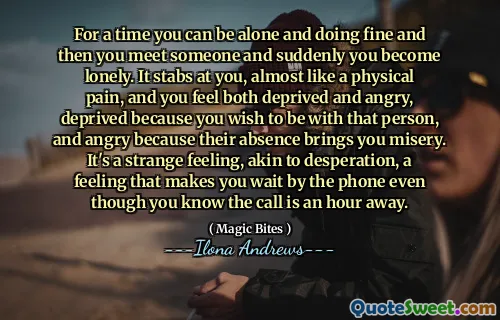
For a time you can be alone and doing fine and then you meet someone and suddenly you become lonely. It stabs at you, almost like a physical pain, and you feel both deprived and angry, deprived because you wish to be with that person, and angry because their absence brings you misery. It's a strange feeling, akin to desperation, a feeling that makes you wait by the phone even though you know the call is an hour away.
[Markdown format] The quote elegantly captures the profound shift that occurs when solitude transforms into a longing for connection. Initially, one may find peace and contentment in solitude, appreciating the freedom and independence it offers. However, the moment we encounter someone special, that tranquility is often disrupted by an intense wave of loneliness and yearning. This emotional turmoil is described as stabbing pain — a visceral reminder of how deeply human connection influences our emotional state.
What makes this sentiment particularly compelling is the paradoxical nature of desire and frustration. The person longs to be with someone they care about, yet their absence causes misery, leading to feelings of deprivation and anger. The analogy of waiting by the phone, even when knowing the call is an hour away, highlights the hope, anxiety, and almost desperation that characterizes human attachment.
This reflection on love and loneliness reveals the delicate balance of independence and intimacy. It underscores how fragile our emotional equilibrium can be once vulnerability enters the picture. The quote resonates universally because it encapsulates a common, yet complex emotional experience: the bittersweet transition from solitude to longing, and the powerful, sometimes painful, impact of human connection on our well-being.
Overall, it invites us to consider the depth of our emotional dependencies and the ways in which love intertwines with longing and human fragility.






